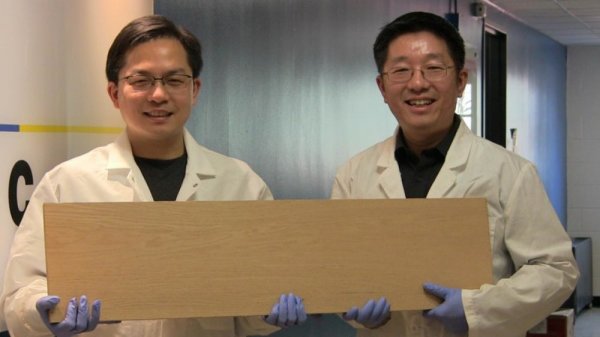Scientists Develop ‘Super Wood’ That Is Stronger Than Steel

By Amanda Froelich Truth Theory
Titanium alloys are commonly used in construction due to their strength and durability. But because they are expensive, researchers at the University of Maryland (UMD) have developed an alternative that literally grows on trees. New Atlas reports that by using a new “densification” process, the team of researchers was able to create a “super wood” that is as strong and tough as steel.
The “super wood” is made through a two-step process. First, it is boiled in a watery mixture of sodium hydroxide and sodium sulfite; this works to partially remove lignin and hemicellulose from the material. The treated wood is then hot-pressed, causing the cell walls to collapse and form into highly-aligned cellulose nanofibers. Densified wood is the end result and it is far stronger than the original material.
Said Liangbing Hu, leader of the UMD team:
“This new way to treat wood makes it 12 times stronger than natural wood and 10 times tougher. This could be a competitor to steel or even titanium alloys, it is so strong and durable. It’s also comparable to carbon fiber, but much less expensive.”
This isn’t the first time Hu has given wood alternative uses. Over the past few years, the researcher has developed burnt-wood water filters, transparent wood, and sodium-ion batteries that are based on wood and leaves.
The researchers went as far as filing projectiles at the wood — you know, to test its strength. The natural wood, unsurprisingly, was obliterated while the super wood managed to stop the projectiles partway through.
According to the researchers, the process can be applied to various types of wood. Additionally, it can be scaled to treat bulk amounts of wood at once. If manufacturers choose, they can even shape the desired product by bending and molding it at the beginning of the process.
The new material is exciting for many reasons. First, it is cheaper and lighter than steels and titanium alloys. It is also a renewable alternative and could allow softer woods to compete with hardier trees that require more time to grow.
“This kind of wood could be used in cars, airplanes, buildings – any application where steel is used,” said Hu. “Soft woods like pine or balsa, which grow fast and are more environmentally friendly, could replace slower-growing but denser woods like teak in furniture or buildings.”
What are your thoughts? Please comment below and share this news!
Source: New Atlas
Image Credit: University of Maryland
Leave Comment: